Middle East
Israel hits Yemen’s Houthi-controlled Sanaa airport in tit-for-tat attack | Houthis News
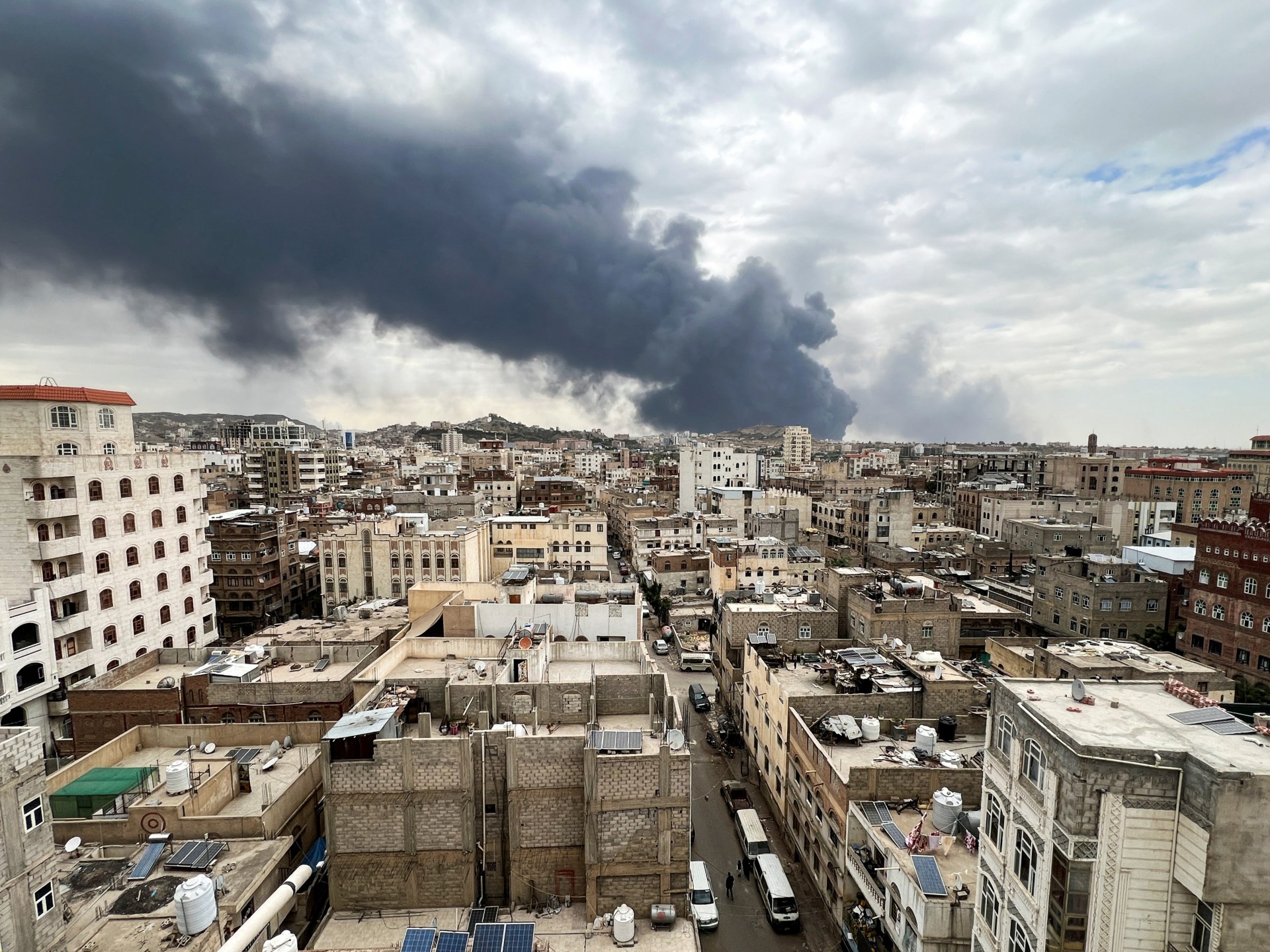
Israeli army claims ‘fully disabling’ the civilian facility, saying it also hit a concrete factory and power stations.
Israel has hit the main international airport of Yemen’s rebel-held capital Sanaa, “fully disabling” the civilian facility, according to the Israeli army.
Tuesday’s attacks that also targeted a concrete factory and several power stations in and around Sanaa came in response to Sunday’s ballistic missile strike near Tel Aviv’s Ben Gurion International Airport, the Israeli military statement said.
The army claimed that “the airport served as a central hub for the Houthi terrorist regime to transfer weapons and operatives”.
“The operation was approved by the Commander of the Air Force and the Chief of Staff,” it said. The military added that it would “continue to act and strike with force” any group that poses a threat to Israel.
Reporting from Sanaa, Al Jazeera’s Mohammed al-Attab said the results of the attacks were not yet clear.
“So far, we don’t know the impacts of this aerial bombardment on Sanaa International Airport or on the power station. We haven’t yet received any reports about casualties or impacts on the infrastructure,” he said.
‘Pure vandalism’
Sultan Barakat, a professor in public policy at Hamad Bin Khalifa University in Qatar, says Sanaa International Airport is “not a big strategic target” and that Israeli claims it is being used to receive supplies from Iran are “simply not true”.
“I think it’s pure vandalism, to be honest. The airport in Sanaa is not a normal airport. It’s under a huge restriction from the United Nations, from the Saudis, from the coalition – it’s under sanctions,” Barakat told Al Jazeera.
He added that attacking the airport will only hinder the operations of the United Nations and humanitarian agencies in one of the poorest countries in the world.
Footage of the aftermath of the airport attack, verified by Al Jazeera’s Sanad fact-checking unit, shows large clouds of dark smoke rising into the air over the capital.
Earlier, the Houthi-affiliated Al Masirah TV confirmed that among the sites targeted is a cement factory to the north of the capital and a power station in the Bani al-Harith area.
The attacks come less than 24 hours after Israel bombed the country’s key Hodeidah port, killing at least one person and wounding 35 others.
The Houthi media office said at least six strikes hit the crucial Hodeidah port. Others hit a cement factory in the district of Bajil, 55km (34 miles) northeast of Hodeidah, the group added.
The Israeli military said the strikes sought to undercut the Houthi military industry, claiming the factory is an “economic resource” for the Houthis and “used to build tunnels and military infrastructure”.
Since November 2023, the Houthis, also known as Ansar Allah, have launched more than 100 drone and missile attacks targeting vessels they said are linked to Israel in the Red Sea. The group says that it acts in support of the Palestinians in Gaza and that its attacks will stop only when there is a permanent ceasefire in the enclave.
Although the Houthis paused attacks during a fragile ceasefire in Gaza this year, they resumed their operations after Israel cut off humanitarian aid to Gaza and resumed its offensive in March.
The United States military under US President Donald Trump has launched an intensified campaign of air strikes on war-torn Yemen since March 15.
Israel has repeatedly struck Yemen, killing dozens of people, including women and children.
Middle East
Israeli attacks kill at least 31 as Gaza blockade accelerates starvation | Israel-Palestine conflict News
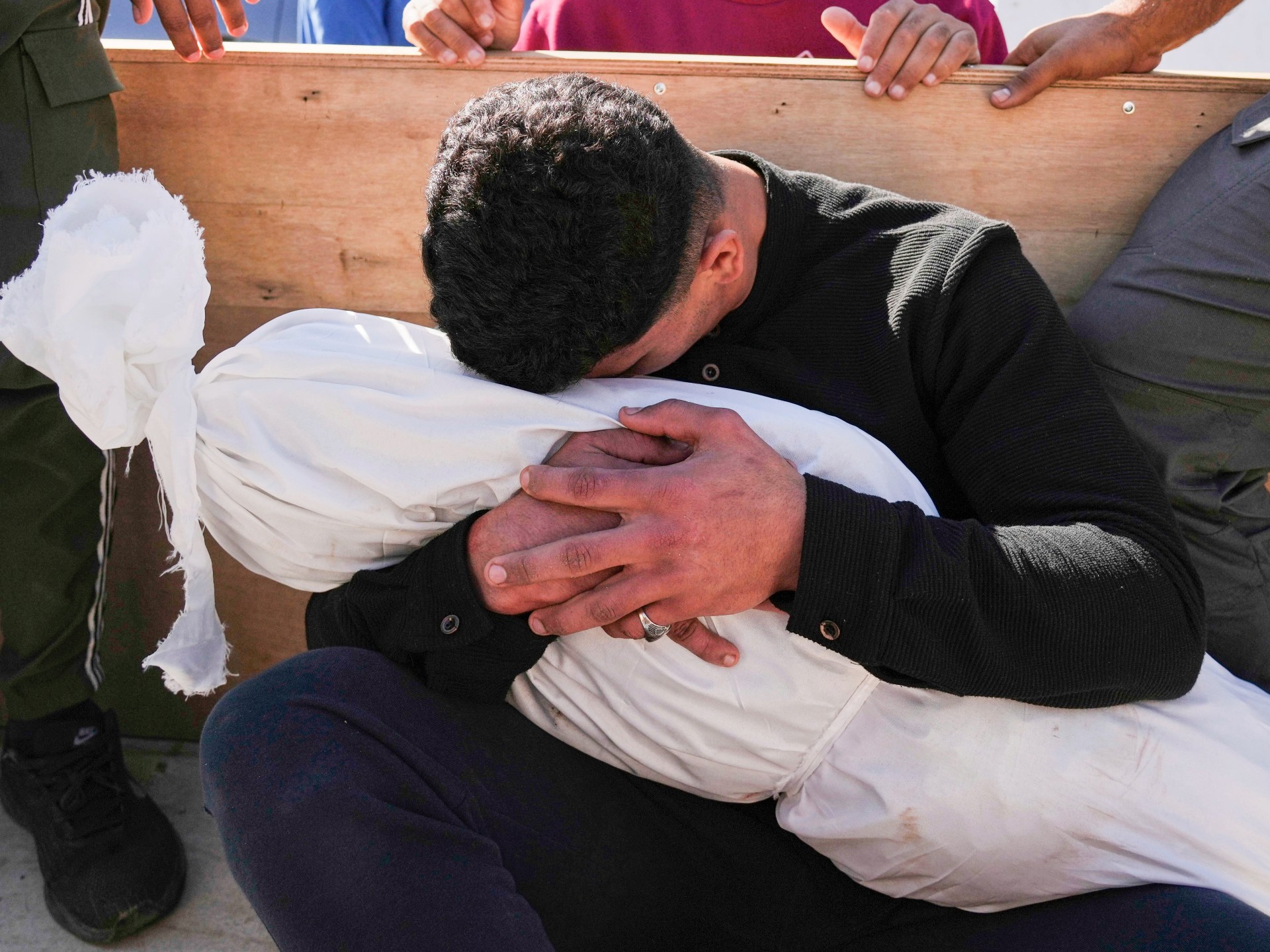
A strike targeting al-Karama School in the Tuffah neighbourhood in Gaza City kills 13 people.
Israeli attacks on Gaza have killed at least 31 people as its more than two-month blockade of the besieged and bombarded enclave has caused acute food shortages, accelerating the starvation of the Palestinian population.
The Israeli attacks were scattered across Gaza on Wednesday, with 13 people killed in a strike targeting al-Karama School in the Tuffah neighbourhood in Gaza City.
Also in the north, another three people were killed and several were wounded in a strike on a house in Jabalia.
Eight people were also killed, a father, his children and cousins, including five in a strike on a home in Khan Younis city in the south.
Another three people were killed, including a child, after a tent shelter was hit in Deir el-Balah, the central Gaza Strip. A wife and husband were also killed when a house was hit in Bani Suheila village, east of the Strip.
The attacks come as Gaza’s civil defence agency said on Tuesday night that 31 people had been killed and dozens wounded after an Israeli attack on a school sheltering displaced people in the Bureij refugee camp in the central Strip.
![[Al Jazeera]](https://www.aljazeera.com/wp-content/uploads/2025/04/Interactive_Gaza_foodaid_timeline-1742987531-1744365779.webp?w=770&resize=770%2C963&quality=80)
The intensified attacks are compounded by an Israeli blockade on essential supplies since March 2, leaving the enclave deprived of fuel items and food, including a worsening shortage of flour. Aid groups have said food supplies are close to total depletion.
A mother of six sheltering at a United Nations agency for Palestinian refugees (UNRWA) facility in Gaza told the agency they had run out of all types of food, with only bread available.
“The State of Israel must lift the siege,” UNRWA wrote on X on Wednesday.
“There must be a concerted international effort to stop this humanitarian catastrophe from reaching a new unseen level,” it added.
Gaza’s health sector is also facing the brunt of the ongoing attacks and the blockade, with at least 88 percent of beds in hospitals occupied and a shortage of medical disposables.
Ceasefire talks
On Wednesday morning, Egypt and Qatar, who both mediated the first ceasefire deal alongside the United States, reaffirmed their commitment to an agreement aimed at ending the “unprecedented humanitarian crisis and alleviating the suffering of civilians by fostering the necessary conditions for achieving a comprehensive ceasefire”.
“The two countries emphasise that attempts to sow discord among brotherly nations – whether through the casting of doubt, distortion, or media escalation – will not succeed, nor will they deter the two nations from continuing their joint efforts to end the war and the resulting humanitarian catastrophe,” a joint statement read, adding that the countries were working alongside the US to reach a deal.
While Israel announced that a new, more intense military offensive would begin in Gaza unless a ceasefire deal was signed, Hamas said talks were pointless.
“There is no sense in engaging in talks or considering new ceasefire proposals as long as the hunger war and extermination war continue in the Gaza Strip,” Hamas official Basem Naim told the AFP news agency on Tuesday.
Middle East
Port Sudan explosions: Lifeline for aid comes under attack for fourth day | Sudan war News
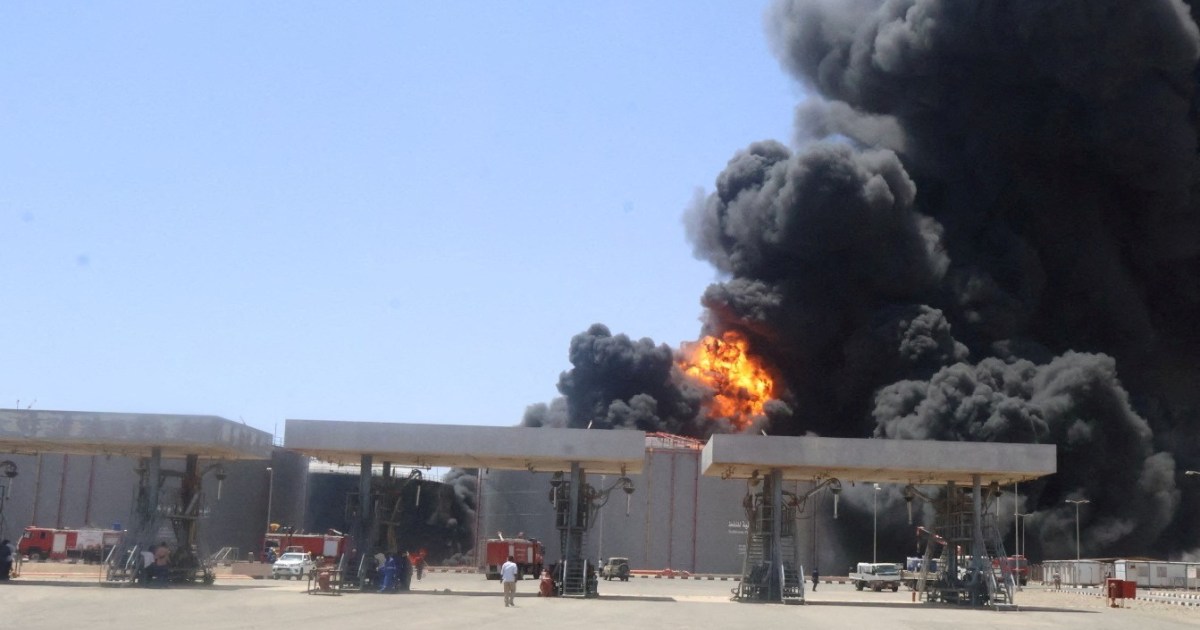
Since Sunday, Port Sudan has been the target of drone attacks that the army has blamed on the Rapid Support Forces.
Explosions have been heard at the Port of Sudan, a critical lifeline and entry point for aid, as attacks on the city continued for a fourth day in the latest confrontation between Sudanese Armed Forces (SAF) and the paramilitary Rapid Support Forces (RSF) in the country’s brutal two-year civil war.
The attacks have been blamed on the RSF by Sudan’s army and by residents.
On Wednesday morning, an army source told the AFP news agency on condition of anonymity that the explosion was due to a drone attack that was met with “anti-aircraft missiles”.
The Port of Sudan on the Red Sea coast had been a haven city hosting hundreds of thousands of displaced people since the war began and serves as an interim seat for Sudan’s military-allied government, which has been at war with the RSF since 2023.
The attacks on Port Sudan have increased fears of disruptions to desperately needed aid deliveries in the country suffering one of the world’s most dire humanitarian crises, and where famine has been declared in some areas.
Nearly all aid into Sudan flows through Port Sudan, which the United Nations called on Tuesday “a lifeline for humanitarian operations”, warning of more “human suffering in what is already the world’s largest humanitarian crisis”.
Drone attacks
Attacks on Port Sudan began on Sunday after drone strikes were blamed on the RSF. The latest attacks come after the RSF targeted the airport, the port and the hotel in the city on Tuesday, a military official said. The paramilitary group has not commented on the attacks on Port Sudan.
Sudan’s Information Minister Khalid Aleiser visited the southern part of the port on Tuesday and slammed the United Arab Emirates, whom he accused of arming the RSF. “We will continue our legitimate battle,” he said.
Defence Minister Yassin Ibrahim announced that the government was severing diplomatic ties with the UAE, including withdrawing its ambassador and shutting its embassy in the Gulf country.
“The entire world has witnessed, for more than two years, the crime of aggression against Sudan’s sovereignty, territorial integrity and the safety of its citizens by the UAE, acting through its local proxy, the terrorist RSF militia,” Ibrahim said.
The UAE has long rejected claims of its support for the RSF and condemned the attack.
The International Court of Justice dismissed a case on Monday brought by Sudan accusing the UAE of breaching the UN Genocide Convention by arming and funding the RSF.
The top UN court said it “manifestly lacked” the authority to continue the proceedings and threw out the case.
Middle East
Trump says bombing of Yemen to stop as Oman confirms US-Houthi ceasefire | Israel-Palestine conflict News

Oman says it brokers truce between Washington and Houthis, says neither side will target the other.
President Donald Trump has announced the United States is abandoning its daily bombing campaign of Yemen based on an understanding with the Houthis as Oman confirms that it has brokered a ceasefire between Washington and the armed group.
“The Houthis have announced to us that they don’t want to fight any more. They just don’t want to fight, and we will honour that, and we will stop the bombings,” Trump told reporters in the White House on Tuesday during a meeting with Canadian Prime Minister Mark Carney.
Trump claimed that the Iran-aligned Yemeni group “capitulated” and has promised not to carry out attacks on shipping. It launched those attacks in October 2023 shortly after the war in Gaza started, saying the attacks were in support of Palestinians.
“I will accept their word, and we will be stopping the bombing of Houthis, effective immediately,” the US president said.
Omani Foreign Minister Badr Albusaidi said the two sides have agreed to a ceasefire.
“Following recent discussions and contacts conducted by the Sultanate of Oman with the United States and the relevant authorities in Sana’a, in the Republic of Yemen, with the aim of de-escalation, efforts have resulted in a ceasefire agreement between the two sides,” he wrote in a post on X.
“In the future, neither side will target the other, including American vessels, in the Red Sea and Bab al-Mandab Strait, ensuring freedom of navigation and the smooth flow of international commercial shipping.”
Mohammed Ali al-Houthi, a member of the Houthis’ Supreme Political Council, wrote in a post on X that “Trump’s announcement of a halt to America’s aggression against Yemen will be evaluated on the ground first.”
“Yemen operations were and still are a support for Gaza to stop the aggression and bring in aid,” he added, suggesting that the group would not halt its attacks on Israel.
Reporting from Washington, DC, Al Jazeera’s Mike Hanna said that the US State Department clarified that the agreement did not relate to the conflict between Israel and the Houthis.
“It was made very clear by the US State Department that the deal relates directly to Houthi operations in the coast of Yemen, specifically in regard to US shipping,” he said.
The ceasefire announcement comes hours after the Israeli military launched air strikes on the airport in Sanaa, inflicting devastating damage and rendering it inoperable.
Dozens of Israeli warplanes also launched several waves of large-scale overnight strikes on Yemen’s vital port of Hodeidah in what Israel said was a response after the Houthis hit the perimeter of Tel Aviv’s Ben Gurion International Airport with a ballistic missile.
The US military has been launching daily air strikes across Yemen for nearly two months, destroying infrastructure and killing dozens of people, including children and civilians.
Al Jazeera’s Ali Hashem said it was “possible” that Iran helped to convince the Houthis to de-escalate their attacks.
“The Omanis have also been the main mediators between the US and Iran, and now the Houthis and the Americans. There are indications that the nuclear talks are advancing, with a framework shaping over sanctions lifting in exchange for nuclear restrictions,” he said.
“It is possible that the Iranians have helped in convincing the Houthis to de-escalate, especially if we see this reflected on the Iranian-American talks. It could have been an incentive for the nuclear talks to be done quicker.”
-

 Sports2 days ago
Sports2 days agoOlympic swim great Gary Hall Jr. awarded 10 medals to replace those destroyed in LA fires
-

 Middle East2 days ago
Middle East2 days agoIsrael bombs Yemen’s Hodeidah port after attack near Tel Aviv | Politics News
-
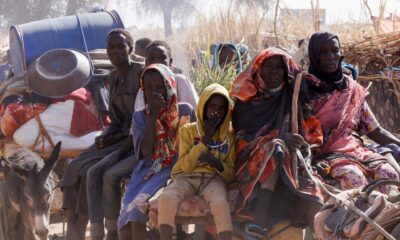
 Middle East2 days ago
Middle East2 days agoICJ dismisses Sudan’s genocide case alleging UAE backing of RSF rebels | Sudan war News
-

 Conflict Zones2 days ago
Conflict Zones2 days agoGunmen kill three police officers in southern Russia’s Dagestan region | Crime News
-

 Education2 days ago
Education2 days agoNew college grads face a tougher job market — again
-

 Sports2 days ago
Sports2 days agoOscar Piastri dominates Miami Grand Prix to claim third-straight win, as Hamilton addresses ‘frustrating’ Ferrari team orders
-
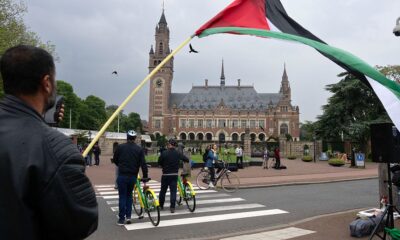
 Africa2 days ago
Africa2 days agoDemonstrators angry at ICJ’s decision to dismiss Sudan’s genocide case against UAE
-
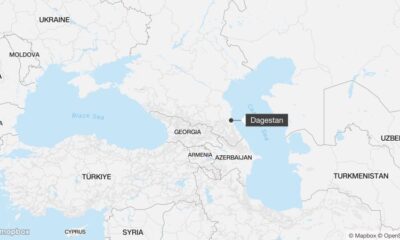
 Europe2 days ago
Europe2 days agoThree police officers shot dead in Russia’s Dagestan




